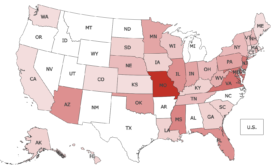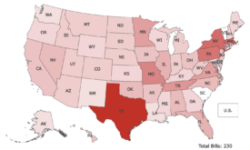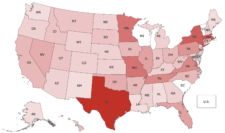 April saw an uptick in legislative activity surrounding public notice issues as many states approached the date they’re scheduled to adjourn. Press groups in Minnesota and Louisiana found themselves in scramble mode as public notice bills they opposed began moving. Although neither situation has been completely resolved, they appear to be headed in the right direction for residents of each state who care about government transparency.
April saw an uptick in legislative activity surrounding public notice issues as many states approached the date they’re scheduled to adjourn. Press groups in Minnesota and Louisiana found themselves in scramble mode as public notice bills they opposed began moving. Although neither situation has been completely resolved, they appear to be headed in the right direction for residents of each state who care about government transparency.
- Minnesota
Indiana adopts digital-newspaper notice
 Indiana Gov. Eric Holcomb signed three bills last month that will impact the state’s public notice laws. When it takes effect on July 1, the most significant bill will make Indiana the first state to authorize government units to publish primary notice on some newspaper websites or e-editions.
Indiana Gov. Eric Holcomb signed three bills last month that will impact the state’s public notice laws. When it takes effect on July 1, the most significant bill will make Indiana the first state to authorize government units to publish primary notice on some newspaper websites or e-editions.
House Bill 1204, which passed both the House and Senate unanimously, allows local governments and state agencies to circumvent the print editions of most newspapers by posting notices in one of their digital products as an alternative. However, the bill only applies to newspapers that distribute fewer than four editions per week; print will remain the exclusive means for government notice in papers that are published more frequently.
February brings more evidence of shift to newspaper websites
 Last month provided additional confirmation that state legislatures are increasingly looking to newspaper websites rather than government sites to supplement and perhaps eventually serve as an alternative to printed newspapers as the primary medium for public notice. Bills illustrating that trend moved closer to becoming law in both Indiana and Iowa.
Last month provided additional confirmation that state legislatures are increasingly looking to newspaper websites rather than government sites to supplement and perhaps eventually serve as an alternative to printed newspapers as the primary medium for public notice. Bills illustrating that trend moved closer to becoming law in both Indiana and Iowa.
Indiana
The tenor of public notice legislation has shifted in Indiana. At the start of 2023 it was one of the two or three states that seemed most likely to abandon newspapers in favor of government websites. Yesterday the legislature approved a bill that could instead serve as a gateway to an eventual migration to newspaper websites.
News websites supplanting government sites as alternative source of notice?
 Public notice legislation introduced so far in 2024 suggests state legislatures are growing increasingly comfortable having news websites serve as an alternative source of official notice. And that comfort seems to have cooled their ardor for moving notices from newspapers to government websites.
Public notice legislation introduced so far in 2024 suggests state legislatures are growing increasingly comfortable having news websites serve as an alternative source of official notice. And that comfort seems to have cooled their ardor for moving notices from newspapers to government websites.
As of the end of last week, new legislation authorizing local news websites or newspaper websites to provide statutory notice in lieu of print had been introduced in at least six states, while bills sanctioning the move from print newspapers to government websites had been introduced in only two states — and one of them is already dead.
Public notice year in review
 2023 was a lot like 2022: A pretty good year marred primarily by the vote of a GOP-dominated state legislature to allow some local governments to publish notice on their own websites in lieu of local newspapers. Last year it was Florida, this year Ohio.
2023 was a lot like 2022: A pretty good year marred primarily by the vote of a GOP-dominated state legislature to allow some local governments to publish notice on their own websites in lieu of local newspapers. Last year it was Florida, this year Ohio.
Twenty-one states saw bills in 2023 that would have significantly curtailed newspaper notice, a number that is at the high end of the normal range for these kinds of bills. The only one to pass was Ohio HB-33.
Move to government websites picks up steam in Ohio
 Townships in Ohio are seeking the same power already granted to municipalities in the state: The power to publish notice via the Internet instead of a local newspaper.
Townships in Ohio are seeking the same power already granted to municipalities in the state: The power to publish notice via the Internet instead of a local newspaper.
Introduced late last week, a new bill, HB-315, would expand townships’ public notice options beyond print, allowing them to post notice on their own websites and social media accounts, or on the Ohio News Media Association’s statewide public notice site. It adopts the same language as HB-33, legislation enacted this summer authorizing cities and villages — “municipalities” under Ohio law — to publish notice online. HB-315 duplicates HB-33’s statewide website option even though ONMA announced after the latter bill passed that without major upgrades the website isn’t capable of accepting ads directly from customers.
Ohio enacts law curtailing newspaper notice
 This story was originally published on Sept. 25 and was updated on Oct. 3. New material is italicized.
This story was originally published on Sept. 25 and was updated on Oct. 3. New material is italicized.
Last month, we reported that through the end of the summer there were no states that had approved legislation significantly altering their public notice laws. We were wrong.
Unbeknownst to most in the newspaper business, two months earlier Ohio Gov. Mike DeWine had signed into law measures buried within the legislature’s 6,198-page budget bill that will bring sweeping changes to the state’s public notice regime. DeWine signed the bill less than a week after it passed both the GOP-dominated state House and Senate by wide margins on June 30.
Public notice picture coming into focus
 With only eight state legislatures still in session the legislative die for 2023 has largely been cast. There’s always a chance that one of those states could still make mischief, but when the calendar turns to Dec. 31 it’s likely we’ll be able to say it was a pretty good year for public notice.
With only eight state legislatures still in session the legislative die for 2023 has largely been cast. There’s always a chance that one of those states could still make mischief, but when the calendar turns to Dec. 31 it’s likely we’ll be able to say it was a pretty good year for public notice.
PNRC has been tracking approximately 230 bills introduced this year that have at least a minimal connection to public notice law. Forty-eight have been signed into law. Of those 48 bills, 13 will probably have a slightly negative effect on government transparency while the impact of about 20 others will be moderately positive. The remainder will have little to no substantive effect.
Louisiana begins transition to newspaper websites
 Last week, Louisiana became the first state to pass a law that will eventually make newspaper websites the primary platform for public notice. HB-650 requires local governments to post their notices on official newspaper websites beginning in 2027. They’ll also be required to publish print notices describing the subject matter and location of the online notices, but — in a reversal of present custom — the print ads will be free and the online notices will be the ads they pay for.
Last week, Louisiana became the first state to pass a law that will eventually make newspaper websites the primary platform for public notice. HB-650 requires local governments to post their notices on official newspaper websites beginning in 2027. They’ll also be required to publish print notices describing the subject matter and location of the online notices, but — in a reversal of present custom — the print ads will be free and the online notices will be the ads they pay for.
HB-650 passed both houses unanimously and is expected to be signed by Gov. Jon Bel Edwards when it reaches his desk.
Several eligibility and self-storage bills advance
 It’s the time of year when many states have either ended their legislative sessions or are preparing to adjourn sine die in the next month or so. We’ve also passed the point in most states when new bills can be introduced or existing legislation that hasn’t passed out of the body in which it was introduced can be considered in the opposite chamber.
It’s the time of year when many states have either ended their legislative sessions or are preparing to adjourn sine die in the next month or so. We’ve also passed the point in most states when new bills can be introduced or existing legislation that hasn’t passed out of the body in which it was introduced can be considered in the opposite chamber.
Nevertheless, several noteworthy public notice-related bills we’ve been following did see some movement last month.
Most importantly, bills in Arizona and Iowa authorizing local governments to publish notices on government websites instead of newspapers were significantly amended before they passed their original chambers.
